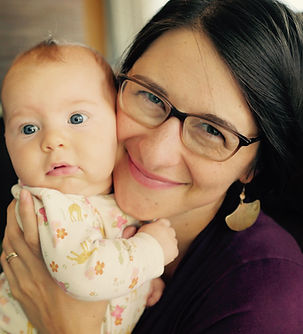

Postpartum Work
All families face challenges after the arrival of a new baby.
You are not alone!
If you feel bad, or don't feel like yourself it's right to ask for help!
You will feel better with good support!
I provide holistic, short-term prenatal and postpartum mental health support for new parents and their families.


Examples of ways I can help:
-
Provide reliable information about perinatal mental health, and hope for the road to recovery
-
Normalize common postpartum experiences and symptoms as well as the stages of recovery
-
Develop/reinforce your support system
-
Address your physical wellbeing and support you in pursuing medical evaluation/treatment to rule out any medical reasons for your present psychological and emotional state
-
Provide a therapeutic relationship in which to safely process challenging thoughts and feelings
-
Teach effective communication and relationship skills that will help you and your partner better navigate this time of transition
-
Provide tools for relief (i.e. coping skills, anxiety-reduction techniques, mindfulness tools, and crisis management)
-
Support parent-baby bonding
-
Support meaning-making and new identity development as a mother or father
-
Process the natural grief inherent in all transitions
-
Help build your confidence as a new parent
We are usually given comprehensive care during pregnancy and childbirth. Unfortunately in this culture, there is little attention given to the mother (and father or partner) in the crucial time after birth. The more you take care of yourself early on, the better you will be able to care for your baby and your family as time goes on. Join the movement to bring to light the critical importance of quality postpartum support and mental health care, for the health of our communities!
Did you know? 1 in 5 mothers nationwide, experience serious depression or anxiety (both treatable) during pregnancy or the first year postpartum (and 1 in 10 fathers)! Also, 80% of all new mothers experience normal "baby blues" in the first few weeks after the baby arrives (Statistics provided by Wendy Davis, PhD, from Postpartum Support International, 2017).
To learn more about common postpartum mental health challenges, such as depression and anxiety, visit Postpartum Support International.
From the International Journal of Women's Health:
"Research supports both psychotherapy and other psychosocial interventions as effective in mitigating symptoms of PPD. Interpersonal psychotherapy, cognitive behavioral therapy, psychodynamic psychotherapy and other supportive interventions such as telephone-based peer support, counseling by a health visitor, and partner support have also shown benefit(s)..." (Fitelson, et. all, 2011)
From a study of mother's experiences of postpartum care in the Journal of Clinical Nursing:
"Three challenges in postpartum care emerge from this study. These are to understand the meaning of caring, to involve family and other new mothers more consciously, and to see the woman as a new mother who needs both to care and be cared for both by her family and friends and by professional carers." (Bondas-Salonen, 1998)
Helpful Resources:
Postpartum Support International - best resource for all information, plus a "Warm" Line to call if concerned, and monthly online support groups!
https://www.postpartum.net/
Wonderful resources for understanding your brain - worksheets, plans, etc!
https://postpartumbrain.com/
The Bump - great articles (this one is about normalizing range of emotions after birth)
https://www.thebump.com/a/postpartum-feelings-to-expect
Mothering Arts Website - Helpful resources/articles/ideas for postpartum wellness
Holding mama (A resource Journal for the Third and Fourth Trimesters - by Dr. Caitlin Scott)
Article about parenting as a child abuse survivor:
Why Aren’t Trauma Survivors Warned That Parenthood May Be a PTSD Trigger?